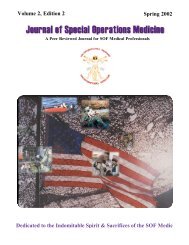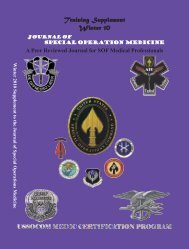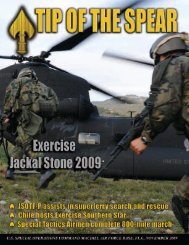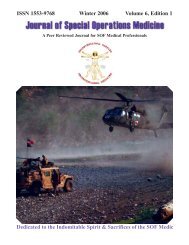Fall - United States Special Operations Command
Fall - United States Special Operations Command
Fall - United States Special Operations Command
You also want an ePaper? Increase the reach of your titles
YUMPU automatically turns print PDFs into web optimized ePapers that Google loves.
failed to reach the summit. All members who reached the<br />
summit took acetazolamide. Four of the six successful<br />
members took a twice daily dose; one member took a single<br />
daily dose. Five of the six successful members began prophylaxis<br />
below 11,000 feet (3353m) and one member began<br />
at Camp Confluencia at 11,112 feet (3387m). Of the nine<br />
that did not summit, two took no acetazolamide, five members<br />
took it once daily and two took it twice daily. None of<br />
the successful members skipped doses, while five of the<br />
seven unsuccessful members who took acetazolamide<br />
skipped at least one dose.<br />
The CDC and the Institute for Altitude Medicine at<br />
Telluride recommends 125mg of acetazolamide twice daily,<br />
beginning the day prior to ascent and continuing that dosing<br />
schedule through the second day at the highest sleeping altitude,<br />
as the drug of choice. (http://www.altitudemedi<br />
Acetazolamide or Not, Prior To Ascent?<br />
cine.org/providers.php). The Centers for Disease Control’s<br />
(CDC) Yellow Book explains that acetazolamide works by<br />
acidifying the blood, thereby increasing the rate of respiration,<br />
resulting in improved acclimatization. While allergic<br />
reactions to acetazolamide are rare, patients who have sulfa<br />
or penicillin allergies may have an allergic reaction to acetazolamide.<br />
(http://wwwnc.cdc.gov/travel/yellow<br />
book/2010/chapter-2/altitude-illness.aspx).<br />
While new prophylactic medications and supplements,<br />
such sildenafil and ginko biloba, are becoming more<br />
commonplace in mountaineering and high-altitude climbing<br />
circles, acetazolamide still appears to be the preferred drug<br />
for the prevention of altitude related illness. This data suggests<br />
that those climbers that took acetazolamide at the recommended<br />
dosing schedule were better prepared to fend off<br />
the ill-effects of altitude. For example, those that took reg-<br />
39

















